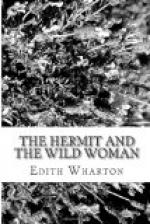The Brant girl was their horror—the horror of all right-thinking Wentworth; a laced, whale-boned, frizzle-headed, high-heeled daughter of iniquity, who came—from New York, of course—on long, disturbing, tumultuous visits to a Wentworth aunt, working havoc among the freshmen, and leaving, when she departed, an angry wake of criticism that ruffled the social waters for weeks. She, too, had tried her hand at Guy—with ludicrous unsuccess. And now, to be compared to her—to be accused of looking “New Yorky!” Ah, there are times when husbands are obtuse; and Ransom, as he stood there, thick and yet juiceless, in his dry legal middle age, with his wiry dust-coloured beard, and his perpetual pince-nez, seemed to his wife a sudden embodiment of this traditional attribute. Not that she had ever fancied herself, poor soul, a “_ femme incomprise_.” She had, on the contrary, prided herself on being understood by her husband, almost as much as on her own complete comprehension of him. Wentworth laid a good deal of stress on “motives”; and Margaret Ransom and her husband had dwelt in a complete community of motive. It had been the proudest day of her life when, without consulting her, he had refused an offer of partnership in an eminent New York firm because he preferred the distinction of practising in Wentworth, of being known as the legal representative of the University. Wentworth, in fact, had always been the bond between the two; they were united in their veneration for that estimable seat of learning, and in their modest yet vivid consciousness of possessing its tone. The Wentworth “tone” is unmistakable: it permeates every part of the social economy, from the coiffure of the ladies to the preparation of the food. It has its sumptuary laws as well as its curriculum of learning. It sits in judgment not only on its own townsmen but on the rest of the world—enlightening, criticising, ostracizing a heedless universe—and non-conformity to Wentworth standards involves obliteration from Wentworth’s consciousness.
In a world without traditions, without reverence, without stability, such little expiring centres of prejudice and precedent make an irresistible appeal to those instincts for which a democracy has neglected to provide. Wentworth, with its “tone,” its backward references, its inflexible aversions and condemnations, its hard moral outline preserved intact against a whirling background of experiment, had been all the poetry and history of Margaret Ransom’s life. Yes, what she had really esteemed in her husband was the fact of his being so intense an embodiment of Wentworth; so long and closely identified, for instance, with its legal affairs, that he was almost a part of its university existence, that of course, at a college banquet, he would inevitably speak for the bar!
It was wonderful of how much consequence all this had seemed till now. . . .




